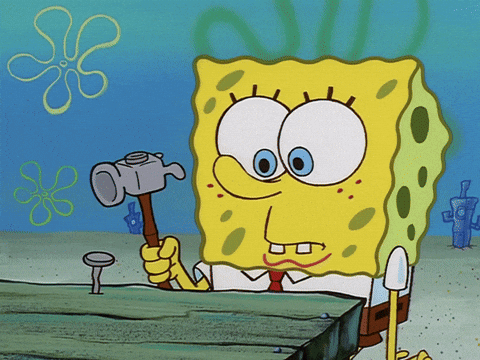- The Deep Dive
- Posts
- What tools are in your toolbelt?
What tools are in your toolbelt?
What we can take from builders, accountants and surgeons to help us hone our craft
Table of Contents
What tools are in your toolbelt?
A builder has a range of tools they can call on to build a house
A surgeon has a range of tools they use to complete successful operations
An accountant uses certain tools to ensure their accounts are in order and compliant.
A tool is useful because it’s designed to help us navigate problems that often pop up in the pursuit of a goal. A hammer and a nail help builders join two pieces of wood together, which provide stability to an overall structure. A profit and loss spreadsheet help accountants understand a business’s financial health, which then helps with the prioritising of resources (I am neither a builder or an accountant, so hopefully those examples are right!)

How I look whenever I need to do any DIY
In coaching, tools don’t just mean drills or training activities. A tool could be the way you set up a meeting, the questions you ask in a feedback conversation, or the framework you use to plan a season. So, as a definition for this post, a tool is:
Any coach behaviour that’s deliberate, repeatable, and purposeful that helps athletes grow and teams thrive.
Within these other professions, there is a deliberateness in their use of tools to achieve goals. I think we can take this approach and apply it to coaching. We have pretty clear goals that we want to achieve. They may be to win competitions, help players transition to the next level, to create a high-performing team environment, to help our athletes achieve personal bests etc.
To achieve those goals, you’ll need to be skilful in a number of different tools. Many of these will be technical or tactical — as that’s our subject matter. For most of you, this is your comfort zone as a coach I’d assume. You probably already have a bank of drills or activities you can lean on to develop consistent technique - your ‘go-to’s for certain technical problems.. You likely have games, scenarios, or video reviews that help players become more tactically adept and transfer learning into performance. These are valuable tools, and need them to be be successful.
But here’s the challenge: what about the other tools that matter just as much? The ones that shape culture, build connection, sharpen feedback, and strengthen planning? Are we putting the same deliberate effort into becoming experts with those tools as we do with the technical and tactical ones? It’s not that technical and tactical tools aren’t important — they absolutely are. But if we only sharpen those, we risk missing the bigger picture. Culture, connection, feedback, and planning aren’t “nice-to-haves”; they’re the foundations that allow all the technical and tactical work to stick. Just like a builder can’t finish a house with only a hammer, a coach can’t reach their goals without a broader, well-practised set of tools.
So here’s a challenge: take a moment to map out the tools you currently use in each of these four areas (or any other areas that are more pressing for you) — culture, connection, feedback, and planning. Which ones feel strong and reliable? Which ones are a bit rusty, or maybe missing altogether?
To spark your thinking, here are a few examples:
Culture: Fortnightly meetings with your team leaders focused on the team environment, that keeps your culture living and not just words on a page. Use these three questions to help frame the conversation (hat tip to Brendon Donkers for these):
What’s humming?
What’s clunking?
What’s next?
Connection: I love the principle that underpins this video. Could you apply this in your own way, giving your players and staff some choice in how they want to connect with you, on a scale of formal to informal. A walk, a coffee, a beer, a meeting in your office.
Feedback: Loop for understanding, to make sure your messages are landing as you intend them
Planning: Conduct pre-mortem meetings, asking questions like ‘if this goes wrong, what will have contributed to that?
The point isn’t to copy these, but to start treating these areas with the same level of attention and craft as you do when sharpening technical or tactical tools. Deliberately chosen and well-practised tools in these spaces might just be the difference between being a good coach and a great one.
When you think of your coaching practice, what are the tools you use to be successful? We’d love to hear some of the tools you use in your daily coaching practice.
Quote of the Week
“His golden rule of managing can be summed this way: before you can manage and lead, first you must establish trust, and before you can establish trust, first you need a personal relationship with your players” Tom Verducci on World Series winning manager Joe Maddon - you can bet Joe had tools he’d honed on building trust and connection with players if this is his philosophy
An Even Deeper Dive
This is a fantastic podcast, interviewing Eddie Jones and going deep on the various tools he uses in his day-to-day coaching. You’ll hear insights into tools he uses around team culture, team selection, reflection, planning and more.
Want to discuss anything you’ve read? Email us at [email protected]. We’d love to hear from you!
Want to share the Deep Dive with friends? Just send them the link below to subscribe


